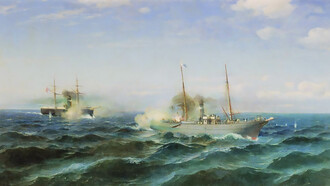On September 4, 1970, at the height of the Cold War, an unprecedented page was written in the history of Chile and of the world's left: For the first time, in a distant Third World country, but one with a solid democracy, a Marxist candidate supported by a left-wing coalition - the Unidad Popular (Popular Unity) - whose central axis were the socialist and communist parties, triumphed in the presidential elections. It was the fourth time that Salvador Allende participated as a candidate. He had done so in 1952, 1958, 1964, until he achieved a majority of 36.63% in 1970, imposing himself on the traditional right-wing candidate, Jorge Alessandri, who obtained 35.29% and on the Christian Democrat, Radomiro Tomic, with 28.08%.
The relative majority obtained was ratified by the national congress with the support of the Christian Democracy and the votes against the right-wing parties. Thus, the candidate of the Unidad Popular assumed the presidency of Chile on November 4, 1970. The 6-year term he was to serve was interrupted by the military coup of 1973, which imposed a bloody and corrupt dictatorship headed by General Augusto Pinochet, which lasted 17 years.
Allende's triumph was celebrated throughout the progressive world who saw a different way to realize the great social transformations without resorting to armed struggle. It was to break the Leninist conception of the seizure of power by the working class and its political vanguard to impose the dictatorship of the proletariat. Allende maintained that it was possible to triumph using the same bourgeois democracy and pointed out that the Chilean revolution would be "with a taste of empanadas and red wine," that is, a way of its own, in accordance with our reality, democratic tradition and cultural characteristics: the so-called "Chilean way to socialism". He knew it would be extremely difficult. He knew them well: the right-wing oligarchs, classists, agrarians, those attached to the land, reactionaries, those allied with foreign capital and the United States, especially. He knew that they would do everything possible to prevent the loss of their farms and privileges. The United States, which had given millions of dollars during the electoral campaign to prevent the victory of the left, immediately declared a covert war on the democratically elected government. The program that Allende and the Unidad Popular proposed to the people of Chile was revolutionary: social, economic and political measures to transform the country.
Among other issues, the nationalization of copper and basic wealth, of the banking system, the expropriation of large companies, the deepening of agrarian reform, the supply of half a liter of milk per day to each child, the expansion of education and universities, the creation of a publishing house, the mythical "Quimantú", which printed 250 titles and 10 million books in less than two years. The process sought the peaceful transformation of Chilean society, from underdeveloped capitalism to a socialist one, in a gradual way, that would expand and conquer the majority support of the middle sectors.
The last elections were held in the month of March 1973, that is, almost 6 months before the military coup, in a dramatic scenario due to the effects of the US economic boycott, high inflation, lack of food and basic products, actions of sabotage by the right wing and the very mistakes of a revolutionary government. A press campaign by the conservative sectors seeking to terrorize the country was added, headed by the main newspaper, El Mercurio. The Chilean Christian Democracy joined the majority of the right wing in an electoral pact to seek a result that would give them 2/3 of the Congress to legally remove Allende. They did not succeed.
The electoral participation was very high, reaching 81% of those registered, where the Popular Unity obtained 44.03% of the votes and the right wing 55.70%, far from the result they expected. This accelerated the pressures and preparations for the coup d'état that would put an end to the dream of Allende, of the Unidad Popular and of the world’s left.
The fate of President Allende's government had been decided in Washington during the Chilean electoral campaign, by the government of Richard Nixon and his national security advisor and later Secretary of State, Henry Kissinger, as has been demonstrated in the investigations of the US Senate itself or in the declassified documents of the CIA, and even in the declarations of the then ambassador in Santiago.
The issue was not Chile, as Kissinger explained to Nixon, but the example it represented for developed democracies such as Italy or France, with large communist parties, and of course, for other Latin American countries. That was the grave danger and the central motive for initiating the covert war at the beginning of Allende's government: economic blockade, embargo on copper, financing of the right-wing parties, the opposition media, terrorist attacks and convincing the armed forces to break with the democratic tradition.
These were the thousand days of the government of the Unidad Popular, with absolute freedom of the press, of information, of trade union association; without any restrictions on political parties, with the parliament and the courts of justice in office, with youth mostly committed to change and with Allende as the central figure. He addressed the United Nations General Assembly in New York in 1972 to denounce U.S. intervention and transnational capital in Chile, receiving a standing ovation as has rarely been seen. Allende, with his death in the government palace La Moneda, and his final speech of denunciation, courage and consequence, defending a democratic process and refusing to leave the country or surrender, wrote his name forever in the history of Chile, of the left and of world progressivism.
The example of the “Chilean Way to Socialism" was and continues to be studied. In Italian politics it had direct consequences that moved the communist leader Enrico Berlinguer, a few days after the coup in Chile, to propose the so-called "Historic Compromise", a government understanding with Christian Democracy aimed at guaranteeing the political stability of the country. The agreement was not to the liking of the United States or the Soviet Union. It had the unconditional support of two-time Prime Minister Aldo Moro, who was assassinated in 1978 by the Red Brigades. To this day it is not clear who was behind this crime.
Berlinguer and Moro understood that only a broad alliance of the center and the left could guarantee the stability of transformative governments and keep authoritarian extremes away. Chile had been a laboratory in that sense, and although Allende tried, a large part of the leadership of the Christian Democracy ended up joining the forces that sought the coup d'état. The exception was only 13 leaders who, immediately after the coup, condemned it and with it put the seeds of an understanding with the democratic left that would come years later. It is also true that in the Unidad Popular itself and in the extreme left, there were sectors that radicalized themselves and that sought to accelerate the process and advance to a total takeover.
The example of the Cuban revolution had permeated deep into Chilean leftist parties. Fidel Castro himself, who in 1971 made an unprecedented 24-day visit to Chile, did not believe in the peaceful path to socialism and supported the extreme sectors. Thus, while for the United States the solution was to end the Chilean experience as soon as possible because of the influence it could have in Latin America and Europe, for Cuba, the eventual consolidation of the Chilean revolution closed the doors to the armed path in the region.
Was the defeat of Allende, the Unidad Popular and of the "Chilean Way to Socialism" inevitable? Was it the radicalization of the process by sectors of the extreme left that unleashed the coup? Should the support base have been widened and Christian Democracy added? Should US companies have been paid when they were nationalized? Many other questions can be added to these, and the answers from the wise men on both sides abound. What are historical facts is that the right wing, before Allende took office, sought to prevent it with the support of the United States.
They murdered the army's commander in chief, Rene Schneider. The CIA financed all major actions that sought to destabilize the government. In 1973, two months before the coup, President Allende's naval aide, Arturo Araya, was assassinated by a right-wing group, and attempts were made to blame the left. The occupation of companies and agricultural lands that were not contemplated in the program of the Unidad Popular, together with the shortage of supplies and the inflammatory speeches of the extreme left, contributed to polarize and move the middle sectors and Christian Democracy, in particular, towards the right.
It is difficult to make a categorical judgment about the experience of the government of the Unidad Popular. For my part, I prefer to stick with the response of former Chinese Prime Minister Zhou Enlai in 1972, when he was consulted about the French revolution. He was reputed to have said: "In reality, it has been too a short time yet to have a definitive opinion.” Although it is not known if it is true that this happened, it seems to me an adequate answer to evaluate what was the brief life of the Chilean revolution, with “a taste of empanadas and red wine.”















